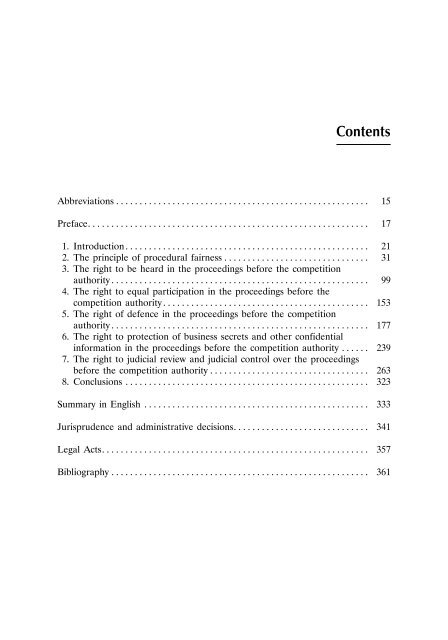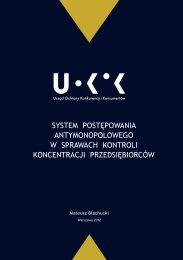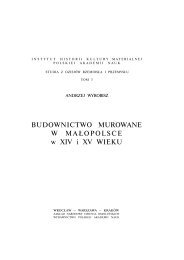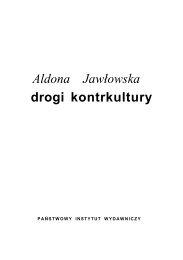SprawiedliwoÅÄ proceduralna w postÄpowaniu przed organem ...
SprawiedliwoÅÄ proceduralna w postÄpowaniu przed organem ...
SprawiedliwoÅÄ proceduralna w postÄpowaniu przed organem ...
Create successful ePaper yourself
Turn your PDF publications into a flip-book with our unique Google optimized e-Paper software.
What do we mean by ‘migrant rights’?The concept of migrant rights certainly includes those basic human rights which are applicablein the UK because of long-standing commitments to the European Convention for theProtection of Human Rights and Fundamental Freedoms.But insistence on ‘migrant rights’ is important because of the need to focus on the fact thatpeople are vulnerable as migrants not only because they have to deal with lack of respectfor their basic human rights, but also because as migrants they are often excluded from thepolitical, legal and cultural remedies which are available in society to ensure the protection ofhuman rights for those who are recognised as citizens.The need for migrant-specific frameworks for law and policy to protect the rights of peoplewho are not citizens has long been recognised in international law. The 1951 GenevaConvention on the Status of Refugees is an example of the way in which the rights of peoplefleeing persecution is protected in international law.But conventions also exist which are intended to provide protection to other groups ofpotentially vulnerable migrants. International Labour Organisation (ILO) Convention 97, forexample, legislates for equality of treatment for migrant workers in the workplace and insome areas of social policy. The United Nations International Convention on the Protectionof the Rights of All Migrant Workers and Members of their Families attempts an even morecomprehensive framework for laws which outlaw gross exploitation and discrimination againstmigrants and their families. However, to date this convention has only been ratified by 34 ofthe UN’s 192 member states and the UK is not a signatory.The ILO is currently leading an international lobby to persuade governments to adopta non-binding, multilateral framework for labour migration which has the explicit purposeof promoting a ‘decent work for migrants’ agenda and a rights-based approach to policy.Even with these initiatives underway it is clear that the public policy debate on migrantrights is only just beginning in the UK and other migrant-receiving states. Much remainsto be done to give the rights-based approach concrete substance in the daily work of civilsociety in these countries.8 Within the last few years a further issue has been addedto the complex array of factors within contemporaryimmigration which raises new questions about the capacityof migrants to assert a rights agenda within and against thegovernment’s control and enforcement priorities. This is thearrival of migrant workers from the countries which accededto membership of the European Union (EU) in May 2004.The numbers involved in this movement, with 375,000 peopleofficially registered by the beginning of July 2006, but withup to 187,000 more estimated to be resident 4 , constitutewhat is possibly the largest ever single wave of migrationto the British Isles. 59 Being nationals of the EU, and with the UK governmenthaving forgone the opportunity to impose transitionalarrangements on the entry of ‘Accession 8 (A8)’ nationalsentering as workers, this group of migrants has rights whichare prescribed in the EU treaty, regulations and directiveswhich establish the principle of equality of treatment withBritish nationals. Because of the circumstances in which thismigration has developed, particularly the controversy whichthe prospect of their arrival generated in sections of theUK media and the orientation the migrants have hadto employment opportunities in low and medium wageemployment, the A8 nationals have found themselvesappraised in often negative ways. In particular, it has beensuggested that they are in competition with UK workers forscarce employment, and that this will result in a driving downof wages and that other negative effects will be experienced interms of demands placed on housing and other services. 610 At the level of the policy discourse the A8 workers havetheir defenders, with commentators and analysts pointing totheir disproportionate contribution to economic growth inthe period since 2004 and their contribution to public servicesthrough direct and indirect taxation. 7 But for those concernedwith the rights of migrant workers the claim that they areeroding the living standards of established residents needsto be addressed by programmes which explore the scope foractivities expressing solidarity between the different categoriesof migrants and groups representing indigenous and longsettledworkers.4 Survey conducted by the Centre for Research on Nationalism, Ethnicity and Multiculturalism,Universities of Surrey and Roehampton, for BBC Two ‘Newsnight’.5 Salt, J and Rees P. (2006) ’Globalisation, Population mobility and impact of migration onpopulation’, ESRC.6 The claim for a deleterious effect on local wages rates and social standards is claimed to havebeen made in a Home Office paper entitled ‘Migration From Eastern Europe: Impact On PublicServices And Community Cohesion.’ authored by Home Office minister, Joan Ryan, MP. SeeMail on Sunday, 30 July 2006.7 See, for example, Institute for Public Policy Research (IPPR) Factfile, ‘EU Enlargement: Bulgariaand Romania - migration implications for the UK, April 2006.
















